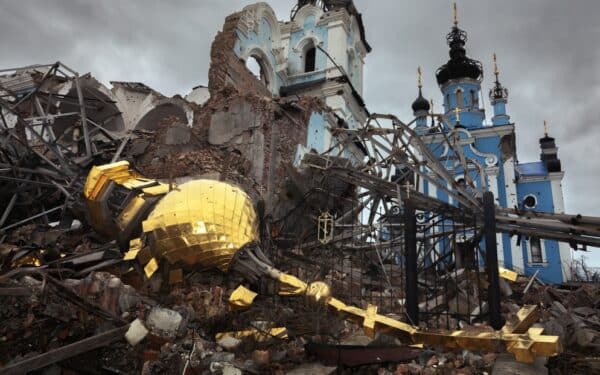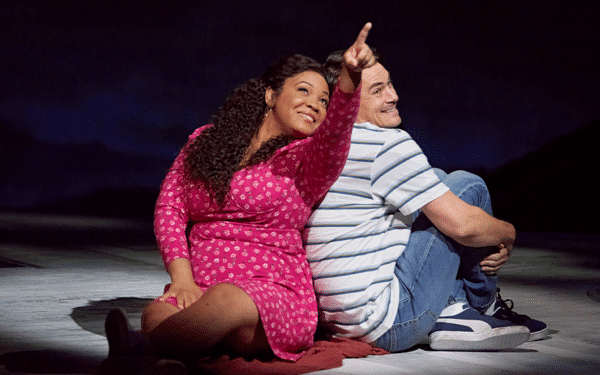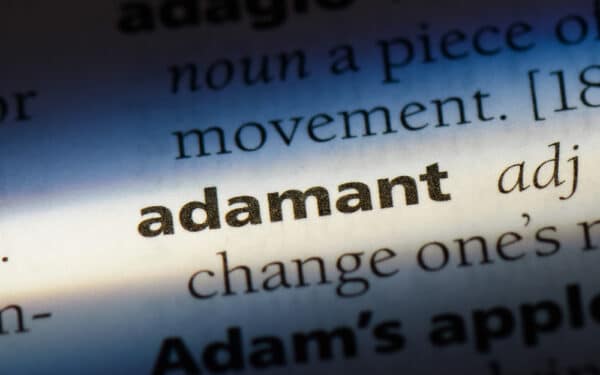Ella Hickson’s ‘The Writer’ is a blistering two hours of unanswered questions. It is relentless and hopeless, but ultimately, to use its own words, ‘defibrillating’.
The Writer of the title walks the stage in numerous guises, from Lara Rossi’s furious 24 year old to Romola Garai’s Writer, with various personas from mythical narrator to exasperated playwright. Also morphing and reappearing is the Director, taking professional and personal forms, ‘enamoured’ mentors (#metoo is in the air, though never said aloud) and overbearing boyfriends, played by Samuel West and Michael Gould.
We watch the Writer struggling to free art, and herself, from patriarchy and capitalism, as embodied by her Director. The Director wants structure, neat endings, sex, and money. The Writer wants ‘awe and fire’ – and a new way to speak. The play shatters that debate and stares into the pieces, arranging and rearranging them – a puzzle with no solution.
The Writer is a 21st century vision of Thomas Hardy’s Eustacia Vye: she wants more, though she is not yet sure what that means. The men in her life (personal and professional) want her to fit in, grow up, and calm down – to want to want an expensive sofa, to have children, and to make art that makes money.
With six different scenes, each with a different structure and genre, and discussions of Picasso, the play itself becomes a kind of Cubist project: a simultaneous vision of multiple forms and ideas – there’s something quietly violent about this brokenness which gives the audience a sense of the chaos and emotion the Writer herself seems to be trying to express. The projection of Guernica across the entire stage at the final moment of the play suggests that the six fragments are simply angles of one struggle, though it distinctly avoids suggesting any escape from that violence.
The Writer is frantic, trying on and flinging off forms as she tries to find a new way to say what she burns to say, as she is continually interrupted by men and by manifestations of ‘maleness’. She is frustrated at every turn. Each theatrical utopia is broken: a man on a hilltop with binoculars trespasses on a mythic lesbian paradise, or a director who walks onto the stage mid-scene and launches into a critique of the very scene he’s just interrupted.
With horrible irony, the Writer’s hunt for a truly female form of expression culminates in Garai crouched on an expensive sofa, holding a huge purple dildo. The female form, a female tribe, a lesbian relationship are all forced to be a temporary respite from the ‘necessary’ reality of writing commercial theatre: inclusive of men, sanctioned by men, bringing profit and success, mostly to men.
For all its radical intention and verbal attack on the theatrical establishment, the biggest laugh of the night in the Almeida Theatre comes from the Writer’s aim to ‘dismantle capitalism and overturn the patriarchy’, and the loudest gasp is elicited by the enraged smearing of sweet potato mash into a Macbook.
The play is decidedly open to charges of navel-gazing but evades and even pre-empts them with its elusive sense of what is real and fictional. It opens at the end of a play (a bad one), moving into a panel about the ‘work in progress’; even conventional scenes are subverted by characters walking around scenery doors, directors visible in the wings, and the Writer commenting that the crying of a baby cannot be coming from next door as ‘There is no next door’.
Despite its fragmented structure and intense meta-focus, the play packs a genuine emotional punch, flinging its audience between tears, laughter, bemusement, and outrage. Much like Hickson’s last work, ‘Oil’, at the Almeida in 2016, the strength of the play’s ideas and its powerful dialogue make the uneven pacing and abrupt ending pretty forgivable.
In the very first scene, the Director tells the Writer that her passion undermines her position: she retorts that she is not trying to put together a convincing argument – she is simply trying to express what she believes to be the truth. This sets the stage for the play itself: it isn’t neat or conclusive, but its hunt for expression has heat and real momentum, galloping through logics, forms, experimentation, discussion, and staging.
The Writer runs at the Almeida until the 26th May



